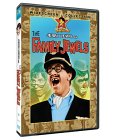| Reviews & Columns |
|
Reviews DVD TV on DVD Blu-ray 4K UHD International DVDs In Theaters Reviews by Studio Video Games Features Collector Series DVDs Easter Egg Database Interviews DVD Talk Radio Feature Articles Columns Anime Talk DVD Savant Horror DVDs The M.O.D. Squad Art House HD Talk Silent DVD
|
DVD Talk Forum |
|
|
| Resources |
|
DVD Price Search Customer Service #'s RCE Info Links |
|
Columns
|
|
|
Family Jewels, The
As is often the case with these pictures, the premise is little more than an excuse to let Jerry run wild. 11-year-old Donna Peyton (Donna Butterworth), is heir to a $30 million fortune, but after the death of her father she must choose a guardian among her six uncles. Shuttled about by loving chauffer and father-figure Willard Woodward (Jerry Lewis), she visits old sea captain Uncle James, surly circus clown Everett, nerdy fashion photographer Julius, "wacky" airline pilot Eddie, and Holmesian detective Skylock. A fifth uncle, a dopey gangster in hiding, Bugsy, also turns up. Naturally, Lewis plays each of these roles. Any guesses on who she'll pick?
The film was apparently fashioned after the multiple role comedies made in the wake of Alec Guinness's eight-role showcase, Kind Hearts and Coronets (1949), and further refined by Peter Sellers in Dr. Strangelove the year before Jewels went into production. But where Guinness and Sellers gave actorly performances playing (certainly in the latter case anyway) fully dimensional characters, Lewis is merely doing shtick: broadly-played, caricatures appropriate for a TV variety show, but paper-thin, disconnected types that operate out of a kind of comedy vacuum, and which serve the film's story and other characters not at all.
The film lacks the inventiveness that marked each of Lewis's earlier films. The Family Jewels, by contrast, is technically and aesthetically sloppy, playing like it was thrown together in great haste. Some scenes clumsily attempt to tie loose expository details together, while others are notable for their complete lack of continuity. Lewis wears his familiar wedding and pinky rings in all seven parts, and the Terry-Thomas-esque teeth of his Captain Eddie change dramatically from scene-to-scene.
But worse than continuity concerns is the sloppiness of the comedy. The picture opens with the same gag that began The Delicate Delinquent (1957) but here the cutting is all wrong, and the potential for a big belly laugh is completely squandered.
The business with the little girl is sappily sentimental. Butterworth's fine, but her lines are overly-precocious, like something out of Little Orphan Annie, rather than the way real children talk, and her unreality is accentuated with Edith Head's overly-cute, poor little rich girl wardrobe.
Beyond not serving the story, the six uncles just aren't very funny. Gangster Bugsy is probably Lewis's best creation, a buck-tooth lampoon of every movie gangster with the voice of "Slapsie" Maxie Rosebloom. But the other uncles are dreary and insufferable. His nasty circus clown is a fascinating, straight-faced portrayal, seen too briefly to make a lasting impression. (Julius being essentially a reprise of his Nutty Professor character and thus not counted here.)
With so much riding on these characterizations, there's little room for other comedy. A pool game Skylock enjoys with hustler Robert Strauss is singularly feeble compared with Sellers' hilarious routine in A Shot in the Dark (1964). The comedy highlight, such as it is, is likely Captain Eddie's plane ride to Chicago, which includes a goofy, in-flight movie whose sets rock along with the plane. The in-flight movie features Anne Baxter and Gerald Mohr, appearing without credit.
Video & Audio
Paramount's DVD of The Family Jewels looks great. It's in 16:9 anamorphic widescreen format (1.85:1), and the elements used are in pristine shape with great color. The Dolby Digital mono sound is fine; English and Spanish subtitles are included, as well as an alternate French audio track.
Extra Features
Considering The Family Jewels is the least interesting of Paramount's new batch of Jerry Lewis DVDs, it's a little surprising the Audio Commentary by Jerry Lewis and Steve Lawrence runs the length of the picture, unlike others which have abbreviated commentary tracks, or none at all. Unfortunately, the length only tests the viewer's patience, as there are lo-o-o-ong stretches without a word, and mostly it's Steve Lawrence laughing and Lewis making the occasional superficial observation. A big disappointment.
Also included is about a minute's worth of bloopers, all in 4:3 full frame format, and a bizarre screen test featuring Lewis and Butterworth, with a lengthy exchange straight out of Waiting for Godot. A trailer, also in 16:9 format, rounds out the supplements. It includes a shot or two not in the picture, and narration by Lewis as the various characters.
Parting Thoughts
The Family Jewels is definitely low-end slapstick and sentiment. Even fans of the comedian will likely be disappointment by this weak, sloppy effort, one unworthy of a rising talent who's directing and starring career was beginning to wane.
Stuart Galbraith IV is a Los Angeles and Kyoto-based film historian whose work includes The Emperor and the Wolf -- The Lives and Films of Akira Kurosawa and Toshiro Mifune. His new book, Cinema Nippon will be published by Taschen in 2005.
|
| Popular Reviews |
| Sponsored Links |
|
|
| Sponsored Links |
|
|
| Release List | Reviews | Shop | Newsletter | Forum | DVD Giveaways | Blu-Ray | Advertise |
|
Copyright 2024 DVDTalk.com All Rights Reserved. Legal Info, Privacy Policy, Terms of Use,
Manage Preferences,
Your Privacy Choices | |||||||














